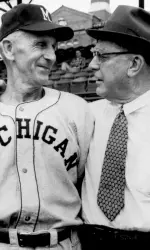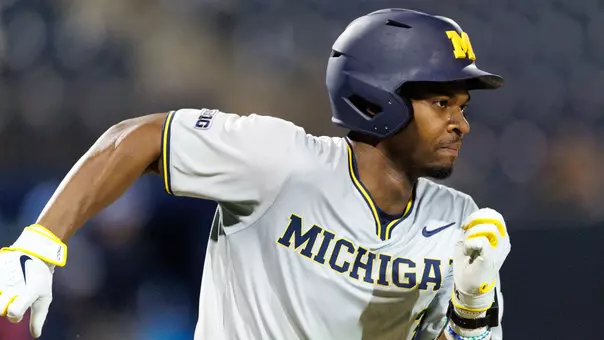
Kornacki: Rickey of Michigan (Part II)
2/25/2016 12:00:00 AM | Baseball
Feb. 25, 2016

Ray Fisher and Branch Rickey
By Steve Kornacki
ANN ARBOR, Mich. -- Branch Rickey built baseball dynasties and engineered one of the major influences of societal change by bringing Jackie Robinson to the Brooklyn Dodgers and breaking the game's color barrier in 1947.
One of the lesser-known aspects of Rickey's life and career was that he graduated with highest honors from the University of Michigan Law School and coached the Wolverines baseball team while taking a full course load.
He coached George Sisler, who went on to become a Baseball Hall of Fame slugger for Rickey's St. Louis Browns, and he also has strong connections to two other men whose names are attached to the core of Wolverines baseball.
Fisher Stadium is named for Ray Fisher, a friend Rickey made while both were major league baseball players and whom Rickey recommended for the baseball coaching position years later.
The Wilpon Baseball and Softball Complex was made possible by donations from current New York Mets owner Fred Wilpon, who pitched as a freshman on scholarship at Michigan for Fisher and became acquainted with the great Rickey while growing up in Brooklyn, where his sandlot and high school teammate, Sandy Koufax, became one of the greatest pitchers in the history of the game.
"Mr. Rickey was a very unusual guy," said Wilpon. "He got the highest honors you could possibly get at the Law School. While he was at Law School, he was the baseball coach. And when he was leaving, he recommended Ray Fisher, who was the coach for (38) years.
"(Rickey) liked Ray Fisher a lot, and he was my coach. I liked him a lot, too, and all of our players loved Ray Fisher. Mr. Rickey also had a real affinity for Michigan."
Wilpon threw batting practice for the Dodgers and later got a job for his wife, Judy, in Rickey's downtown Brooklyn office when Rickey was attempting to form the Continental League, which didn't take off but helped usher expansion into baseball's plans. Judy worked for Rickey for two years in what she described as position that called for doing anything that needed being done, including serving as his secretary when the usual one took vacation time.
Fred recalled approaching Rickey about a job for Judy, who combines with her husband to donate to Michigan through the Judy and Fred Wilpon Family Foundation.
"I made it known to the gal at the front desk of Mr. Rickey's office that I was from the University of Michigan because I knew Mr. Rickey had graduated from Michigan," said Wilpon, a 1958 Michigan graduate, who was working as a salesman at that time. "He heard that from an office close by, recognized my name from a couple years before, and he asked me to come in."
Fred then mentioned to Rickey that Judy would like to work for him.
"And she got the job," said Wilpon. "So, she worked with him. I got to meet him with Judy any number of times, went to his apartment once or twice."
The Wilpons, married for 57 years after meeting as Michigan students, got a chance to see Rickey's brilliance from behind closed doors and in informal settings. They got to see what made him tick, what made him great.
"I studied him a lot," said Fred. "I think No. 1 was his intellect, then his work ethic, and his ability to try new things and discover a new way. Just like current baseball people are finding a way with sabermetrics, he found ways way before sabermetrics. And he was the father of the minor league system, which is fundamental to baseball. He also had the ability to hire people who understood the game of baseball intimately.
"He was the person to select Jackie Robinson, knowing he had the emotional and intellectual fortitude not to fight back (against bigots who antagonized him). He was as important to the civil rights movement as any other person, including Dr. (Martin Luther) King (Jr.)."
Judy added on Rickey: "He was gruff and sometimes scared people. But he had a great, soft underbelly. He was very considerate, and he had vision."
Fred donated a significant amount of the money necessary to create the Branch Rickey Collegiate Chair at Michigan that is held by Evan Caminker, who also raised the money necessary for the endowment. The Rickey chair is an honorific title that recognizes the achievements of its namesake, but Richard Friedman, the Ralph W. Aigler Professor of Law at Michigan, would like to see more than that on campus.
"It's not in the cards to rename the (Wilpon) Center or even the baseball stadium," said Friedman, who has written and spoken extensively about Rickey. "But there ought to be some physical remembrance of Rickey here. I mean, he was the coach of the baseball team and became a great American hero.
"I think it's great that we have a Rickey professorship; I think that's wonderful. It would be nice if there was a way to name something in his honor at the baseball complex -- the Rickey Pavilion (seating area) or something else."
Friedman paused, leaned back in his chair at the Law School offices, and raised his eyebrows.
He added, "And it wouldn't be inappropriate to have a statue -- something so that the thousands of people who come to watch baseball and softball every year will realize that long ago we were associated with this great hero."
Fred Wilpon, in a recent telephone conversation, completely agreed with Friedman's observations.
"I think that's a great idea," said Wilpon. "We would have to support it."
Wilpon said current baseball coach Erik Bakich, who led the Wolverines to the Big Ten Conference Tournament championship in 2015, shared another desire connected to Rickey with Wilpon:
"Erik said, 'It would be really helpful if we had the ability to have a real classroom setting down at the baseball complex.' And it turns out that the university is clearing out an area that used to be the laundry (facility) on the first-base line side at Fisher Stadium and re-locating the laundry (operation). So, Judy and I have sponsored that and that classroom is being built.
"Wouldn't it be something to have the Branch Rickey Classroom? He was a man who represented both the finest in academics and baseball. Here's a place where athletes studying to be scholars could attend class. What Judy and I said is that it should not be confined just to athletes, though. Any kind of classes you could teach there would be fine. Coaches also could give lectures there."
Education was the sole reason Rickey, who taught himself Latin as a teenager and was a country school teacher, came to Michigan after a short professional playing career.
Major League Baseball was in its infancy when Rickey played, primarily as a stocky, 5-foot-9 catcher, for the St. Louis Browns and the New York Highlanders. The Highlanders would change their name to the Yankees in 1913, six years after Rickey played for them.
He broke into baseball in 1905, the same year as Ty Cobb began with the Detroit Tigers. Player salaries didn't begin to escalate until Babe Ruth came along a decade later, and the financial lure of today's commonplace million-dollar contracts didn't exist. Rickey, according to www.baseball-reference.com, never earned more than $2,700 in one season.
Rickey played only three seasons, batting a meager .239 for his career while also appearing briefly in 1914 as a player-manager, and was wiser than most. He'd already graduated from Ohio Wesleyan and saved money from his baseball salaries to help pay his way through the Michigan Law School beginning in 1909.
Though, his ability to physically attend was a challenge. Rickey left a sanitarium in Saranac Lake, New York, where he was recovering from tuberculosis, at his own risk. He was discharged despite still at a health risk, but was determined to begin classes that fall.
Friedman wrote in a story about his years here that Rickey brought enough credits gained while attending Ohio State to begin as a second-year student.

He excelled despite those health trials, though, and in 1910 also became the baseball coach of the Wolverines. Rickey used a letter-writing campaign to counter the dean of the Law School, who advised him against the job. Athletic director Phil Bartelme hired Rickey, according to Friedman, in part just to stop the "flood of letters" in support of Rickey.
Rickey was so thrilled to secure the coaching position with such support that he wrote to his parents in a letter dated Jan. 13, 1910:
"I have secured the position of Baseball coach here -- thanks to many good friends. It was really their victory for the odds were against me & I counted for very little. My greatest joy is not the paltry job or its incidents but the fact of being known by men of such standing and character that their commendation places me above the pull and push of the other fellow. It shall ever be my steadfast purpose to keep, increase and yet merit the esteem those men have expressed for me. No more time or space.
Love to all Branch"
Rickey was part of the Class of 1911 at the Law School but continued as the baseball coach through 1913, posting a 68-32-4 record in four seasons.
After briefly practicing law in Boise, Idaho, Rickey became the field manager for the Browns in 1914, beginning a glorious and accomplished run of over 40 years in managing and running major league teams.
Rickey served as an executive and general manager of the St. Louis Cardinals (1925-42), Brooklyn Dodgers (1943-49) and Pittsburgh Pirates (1950-55). He turned the Cardinals into a powerhouse, winning the World Series four times, and set the tone for success in Pittsburgh by acquiring Hall of Fame right fielder Roberto Clemente and others. He guided the Dodgers to two World Series during his tenure and set them up to dominate the National League in the 1950s by signing Robinson to go with other future Hall of Famers such as Roy Campanella, Pee Wee Reese and Duke Snider.
"He was a fierce businessman and a fierce competitor," said Friedman. "He was also a very moralistic guy. He said he couldn't meet his maker with the knowledge that His black and white children were kept apart in a game that had given him everything."
That feeling, Friedman said, was at the root of Rickey hand-picking Robinson, a highly-skilled second baseman, to be the player who broke baseball's color barrier.
Friedman also noted that Moses Fleetwood Walker, who attended Michigan Law in 1881-82, was actually the first African-American major league player, with the Toledo Blue Stockings of the American Association. Friedman wrote that after Walker's career ended in 1889 the league's directors agreed to offer no further contracts to black players.
"I'm old enough that the first game I went to was at Ebbets Field," said Friedman, who grew up on Long Island. "My father had season tickets in the 1940s. A very present part of my baseball knowledge was Rickey and Robinson and the integration of baseball. And then when I came (to Michigan), I learned that he came from this place. I thought, 'How cool.'
"I think he's a great American hero. And while he didn't practice law for long, he still showed the signs of his legal training in baseball."
Rickey used his knowledge of contract law to void a contract Sisler, one of his Michigan players, had signed with the Pittsburgh Pirates. Sisler, Rickey argued, was under the legal age when he signed that contract and should be free to sign with any team. And when Sisler was granted that opportunity, Rickey signed him for the St. Louis Browns.
"Sisler was supposed to be a pitcher but he had a sore arm," said Friedman. "It turned out he could hit."
Friedman chuckled because Sisler batted .340 with 2,812 hits over 15 seasons in the majors. He won American League batting titles by hitting .407 in 1920 to break Cobb's string of three consecutive batting crowns and hitting .420 in 1922 to finish ahead of Rogers Hornsby and Cobb, both of whom hit .401.
"Sisler was an engineering graduate and a bright fella," added Friedman.
After one season, the baseball team manager wrote of Rickey, elected to the Michigan Hall of Honor for athletics in 1985, in the University yearbook:
"He was the hardest worker on the squad, kept everybody working to correct this or that mistake, and taught the game from beginning to end. He had the 'pep' and the head for the team, and without him there would have been no season to write up."
Yet, Friedman said it was Michigan's Law School that attracted Rickey to Ann Arbor.
"He had the intention of becoming a practicing lawyer," said Friedman, an expert in evidence and Supreme Court history who joined the faculty here in 1988. "All the time he played ball, it was to save up enough money so he could go to law school. Baseball didn't pay all that well then, and there's no indication anywhere that before he came to law school his intention was to make his career in baseball.
"But when he got here, and he did very well here (academically), when the coach's position became open here, he became very eager for it and applied for it."
Friedman said Rickey received the Juris Doctor degree, the more prestigious of the two law degrees Michigan offered more than 100 years ago. Friedman said that was based on Rickey receiving a "+" in the vast majority of the courses he completed. Friedman added that grades were not given at that time and students were assessed on how well they mastered courses.
"Branch went off to Idaho to practice law and didn't get a lot of work," said Friedman. "I think he was glad to come back and coach here (during the springs), and then he got hired away (by the St. Louis Browns). Sometimes people get their legal education and go off and do different things."
How did Rickey's law degree end up impacting him as a baseball executive?
"He was always a tough negotiator," said Friedman. "One thing you're taught to do in legal training is to think of non-obvious consequences. In the Robinson situation, he was always thinking about that. It wasn't just taking the best black ballplayer he could find. He had to think of how it would play out for that player in every way."
Rickey stayed in touch with the Law School and the baseball program over the years, and he recommended Fisher, who became the winningest coach in Michigan history (636-295-8) while winning 15 Big Ten championships and a College World Series in 1953.
Caminker, a Law School dean and the Branch Rickey Collegiate Professor of Law, is connected to Robinson's alma mater of UCLA as well as Rickey's. Caminker taught in the UCLA law school until coming to Michigan in 1999, where he heard Yale Kamisar speaking about Rickey and his significant contributions to this school.
Kamisar, the Clarence Darrow Distinguished University Professor of Law Emeritus at the Law School, is a nationally recognized authority on constitutional law and criminal procedure. He's also a baseball fan.
"Yale Kamisar brought the Rickey connection to my attention," said Caminker. "I thought to myself, 'Why don't we celebrate that in some way?' I thought of being a dean and making connections with our alumni, and we were in expansion plans, where we were discussing names that ought to be recognized for various things.
"During that time, I learned about the possibility of collegiate professorships at the University, where the school can raise money to create a professorship in the name of somebody who was a previous professor. It's an endowment. At that time, it took a $2 million donation to create a new chair. But to name a collegiate chair, it only took a half million dollars.
"Now, Branch Rickey was never a professor. But I developed an argument that he coached the baseball team while he was (attending and) teaching here. So, it should count as a faculty position. I went to the Provost (and executive vice president for academic affairs) at the time, I think it was Terry (Teresa) Sullivan, and she was amused. But she was a sports fan and said, 'OK.' She agreed with me that there should be such a chair."
Caminker met Branch Barrett Rickey, the grandson of the legend and current president of the Pacific Coast League, in 2007, in conjunction with the 60th anniversary of Robinson's integrating the game. Rickey invited Caminker to a celebration at Dodger Stadium in Los Angeles, and Caminker made connections there via Dodgers ownership that were vital to his fundraising effort.
"Fred Wilpon, of the New York Mets, and Sam Zell, then of the Chicago Cubs, were two other people with Michigan ties who owned ballclubs," said Caminker. "So, I cold-called Fred Wilpon. He said, 'I am going to give you $200,000 and I'm going to make my friend, Bud Selig, give you $200,000, too.' I thought, 'This is good!' I wasn't expecting that."
Selig, then commissioner of Major League Baseball, was formerly the owner of the Milwaukee Brewers. Caminker then approached Zell, asking for $100,000 to complete the endowment, and also received a quick positive response. Zell, a Michigan Law School graduate and a major benefactor for his alma mater, was the CEO of the Tribune Company in Chicago, which owned the Chicago Cubs at that time.
Everyone was enthusiastic about memorializing Rickey, who made his mark in every way possible at Michigan.
"He was a small-town Ohio boy," said Friedman. "I never got the sense of him thinking of going to Harvard, Yale or Columbia -- which were also great law schools of the time. But Michigan had the greatest law school in the Midwest, and this was where he wanted to go.
"He had three black classmates, which was relatively unusual, and they all achieved some prominence."
Austin T. Walden, one of those three, became a renowned civil rights lawyer in Georgia and worked effectively for blacks to realize the right to vote in Atlanta, according to Friedman. Walden influenced integration even before Rickey made his impact in that area with Robinson.
The Wilpons knew Jackie and his wife, Rachel, from the beginning of their association with Rickey and the Dodgers.
"Judy and I have been friends with the Robinson family for a long time," said Fred Wilpon, who also served as a babysitter for the Robinsons. "I started with him when I was pitching batting practice at Ebbets Field. Rachel is one of our best friends."
The Jackie Robinson Rotunda is housed within Citi Field, home of the Mets, and Wilpon invited Rickey's grandson, Branch Barrett Rickey, for the grand opening. Rachel was there, too.
Rickey's son, Branch Rickey Jr., also attended the Michigan Law School but was called away from academics by his father to fill a baseball front office position. The three generations of Rickeys lived across from each other in rural Fox Chapel, outside of Pittsburgh, for many years.
Rickey served as chairman of the Pirates until 1959. After being unable to get the Continental League off the ground because Major League Baseball countered by expanding, Rickey became a player personnel consultant for the Cardinals in 1962. Baseball enveloped his mind right up until his death, at 83, in 1965.
That baseball journey began in Ann Arbor, and when he departed the Wolverines after the 1913 season, the "Michigan Daily" bid him farewell:
"(Rickey) leaves with a sterling record behind him, and a host of friends to remember him. ... Above all he taught clean ball, gentlemanly tactics, and clean living. ... A gentleman, a true sportsman, and a man, he will long be remembered by those who love and help Michigan athletics."










